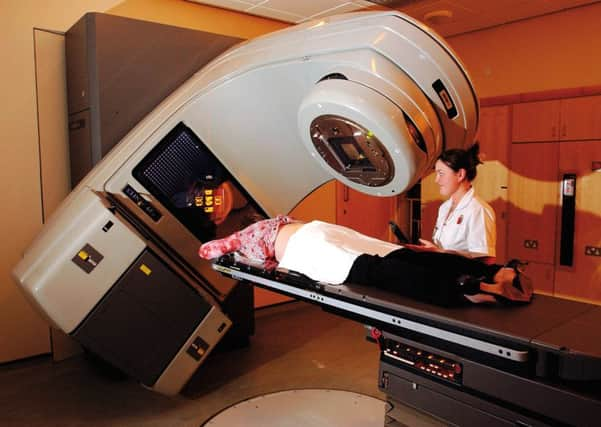Cancer patients ‘losing out on radiotherapy cures’


Glasgow-based cancer expert Professor Anthony Chalmers will tell the Scottish Cancer Conference in Edinburgh tomorrow that state-of-the-art machines in Scotland’s cancer centres are not being used to their full potential because of a dearth of experienced staff.
As well as normal treatments, the machines, known as linear accelerators – called “linacs” for short – can deliver advanced forms of radiotherapy which can target cancers more accurately with fewer side-effects.
Advertisement
Hide AdAdvertisement
Hide AdBut lack of specialist clinical oncologists means staff are struggling to plan for these new treatments.
Patients in some areas are more likely to receive the treatments than other parts of Scotland, according to Prof Chalmers, chair of clinical oncology at Glasgow University.
He told Scotland on Sunday: “As well as standard treatments, Scotland’s linacs have the ability to deliver advanced radiotherapy treatments that target cancers more accurately, minimising damage to the surrounding healthy tissue.
“In some cases this enables us to give higher radiotherapy doses to the cancer. The new techniques can also significantly reduce the number of treatment sessions required, improving patients’ experiences and outcomes overall.
“All cancer centres in Scotland should be delivering advanced radiotherapy to all the patients who would benefit.”
There are specialist machines at cancer centres in Inverness, Aberdeen, Dundee, Edinburgh and Glasgow, with a further satellite facility due to open soon at Monklands Hospital.
Prof Chalmers will tell the conference how advanced radiotherapy can offer curative treatments in as few as three to five sessions in some cases, compared to six to eight weeks of daily treatments for many patients receiving standard radiotherapy.
Gregor McNie, of Cancer Research UK, said: “Scotland is very fortunate to have a world-class infrastructure for delivering advanced radiotherapy, but unfortunately this will mean nothing to patients until all these machines are being used to their potential.
Advertisement
Hide AdAdvertisement
Hide Ad“We understand solutions to this problem are complex and would likely involve, among other things, increased recruitment of specialists from a range of backgrounds.
“However, while there is no quick fix, the stark reality is that patients are missing out on potentially curative treatments, so this issue must now be nothing less than a top priority for the Scottish Government.”
Dr Paddy Niblock, a consultant clinical oncologist in Dundee and chair of the Scottish Standing Committee of the Royal College of Radiologists, said: “It’s fantastic that we have these resources but the challenge is how do we make the best out of what we are getting. The answer is the workforce for sure.
“What used to take 20 minutes will now take two hours, so how can you accomplish that with the same number of people to the same standard?”
She called for greater investment in IT infrastructure to allow NHS boards to work together on cases, so specialists in Dundee could prepare treatment plans for patients in Inverness.
Health Secretary Shona Robison said: “Cancer treatment is a priority for this government, and we are currently developing a new cancer plan for how we will develop services in the future.
“We’ve invested over the years to have state-of-the-art radiotherapy equipment in all of our five cancer centres as well as the new satellite centre soon to be up and running in Lanarkshire.
“Through the new cancer plan we’ll be establishing the next steps in order to make the maximum use of these facilities.”